

41 Must-Know Phrases For Your Self-Introduction In German
- share
One of the first lessons you will learn when learning a new language is how to introduce yourself. Self-introduction in German can be more complex than in English. In this article, I will explain how to introduce yourself in various situations based on my experience correctly.
Key takeaways
- In this article, I summarize the learnings I went through over the years I lived in Germany.
- German can be very complicated for foreigners when learning more about the language while living in Germany .
- First, I’d like to give you some standard greetings for everyday situations .
- Second, I will give examples of how to let your acquaintance know where you come from .
- You will also learn more about situations when you get asked what you are doing for a living .
- There are two everyday situations that I am covering here as well: Self-Introduction to your neighbors and introducing yourself in German at work .
- Last but not least, I am covering how you can introduce yourself when you are a student and how to introduce others .
When is self-introduction needed?
Self-introduction in Germany is needed in various situations. Meeting (new) friends or neighbors and introducing yourself in German to them is different than in a work environment. The latter one requires, most of the time, a more formal approach.
It is also advantageous to introduce yourself properly to a new person when going to the authorities, visiting a doctor, or something similar. But let me answer some questions before I dig deeper into specific situations for you.
Is there a structure for self-presentation in German?
There is not necessarily a specific structure required for self-introduction. I am using a combination of greeting, my name, where I am from, what I do for a living, and where I live. Some of my friends and colleagues use a shorter version, especially in a less professional-related situation.
Sometimes it can already be enough. Just use a standard greeting and your name. But more on that in one of the later paragraphs.
Essential greetings for personal introduction in German
There are some basic greetings for self-introduction that I would like to tell you about based on my own private and professional experience. Depending on the state or region you live in, local differences may be that locals heavily use.
While the local versions are less commonly used in professional environments, it’s always nice to know what those mean. Since I live in the southern parts of Germany, I am very much used to “Servus” or “Griaß God” after a few years.
Still, I hardly use those because I am not speaking the local dialect properly to continue my conversation in the same way.
Informal greetings
- “Hallo” means “hello” in English
Informal locally colored greetings
- “Moin” means good morning in some northern parts of Germany
- “Tach ” has the same meaning as the greeting “Guten Tag” in north-western parts of Germany
- “Servus ” is the informal greeting similar to “hello,” used in southern parts of Germany
- “Griaß God” and “Griaß Eana ” are the locally colored versions of saying “Grüß Gott” or “Grüße Sie” being used in the southern parts of Germany.
You can’t even find these regional or local expresions in German dictionaries such as Duden .

Formal greetings
- “Guten Tag” or “Grüß Gott“ (the latter one is used mainly in Southern Germany and Austria), meaning a formal “hello” or “good afternoon.”
Greetings based on daytime
- “Guten Morgen” , meaning good morning in English
- “Guten Tag” is used throughout the day, a way to say “hello” in a formal way in English
- “Guten Abend” is only used in the evening, usually when it’s about to get dark or after 7 – 8 pm.
There is no suitable equivalent to “Good afternoon” in German. You usually say: “Guten Tag”.
When introducing myself in German, how do I say “where I’m from”?
From my experience, I can tell you that it’s not unusual to get asked where you are from. Germans usually ask that out of genuine curiosity. So if you want to be prepared for a situation when that question is coming up, let me help and tell you how to say where you are from.
If you want to mention where you are coming from during your self-introduction
- “Ich komme aus (country)” which means “I come from (country)” in English. You can add your country or the country and city you are coming from.
- In case you are adding your city, the sentence is slightly changed into “Ich komme aus (add your country) aus der Stadt (add the name of the city). The English equivalent would be: “I come from (country) from the city of (name of the city)” .
Germans usually have a pretty good geographical knowledge. Many will know about your country a bit more than just the name.
How do you say what you do in German when you introduce yourself?
As soon as the conversation get’s going, people will sooner or later ask you what you are doing for a living. If you still go to school, you can say
- “Ich arbeite als (add your profession)”. That means “I work as (add your profession)” in English.
This reflects the basic information I was asked several times when talking to friends, colleagues, people I met, and neighbors. This leads me to another topic, introducing yourself in German to your neighbors.
Introducing yourself in German to your neighbors
When it comes to self-introduction to neighbors, the situation is slightly different. I experienced that knocking on your neighbor’s door right after moving in is not very common. But it highly depends on your living situation.
Please don’t feel offended if your neighbors next door won’t do the same right away. You might always want to mind your neighbors’ privacy. Based on three situations, I’d like to explain the difference.
Your personal introduction in German when living in larger apartment complexes
Living in an apartment complex can be anonymous, whereas rural areas can be less anonymous.
When I arrived in Germany, I lived in an apartment complex. Throughout the first weeks, I met several people that lived on the same floor. The only exchange was greeting each other by saying “Guten Tag” or “Hallo”.
After a month or so, when coming back from grocery shopping, I was asked who I was and where I came from for the first time. So I replied in the following way
- “Guten Tag! Ich bin (put in your name). Ich komme aus (put in your country and city).” “Hello! I am (your name). I come from (country and city).”
If you want to be more precise about where you live within the complex during your self-introduction, you may add the floor of your apartment. You can add
- “Ich wohne im (number of your floor) Stock).” “I am living on floor number …”
As a side note: In German, the ground floor is called “Erdgeschoß” and the first floor is called “erster Stock”. In the US and other countries, the ground floor is already the first floor, while the “erste Stock” is already the second floor. This might cause some confusion, so be careful with it.
Self-introduction when living in smaller apartment complexes in Germany
If you move to a smaller apartment house with only a few apartments, people may appreciate your introduction to German after a few days. You may either have a quick chat with people when you meet them in front of their apartment or hallway.
In situations like that, you can use a short version like
- “Hallo! Ich bin (put in your name) und wohne im (number of your floor) Stock“. “Hello! I am (your name) and live on floor number X (number of your floor).”
How to present yourself in rural areas with single houses
Self-introduction in a rural area in Germany might be very different from that. It can happen that you either get asked by some direct neighbors right on the day of moving in where you are coming from and who you are. Others may wait to see you, for example doing your chores in the garden, and ask you then.
It may also be helpful to go to your neighbors and introduce yourself in German as soon as you see them on the weekend in their garden or front of their house.
You may use a variation of the standard phrase and say
- “Guten Tag, ich bin (put in your name). Ich bin kürzlich hier eingezogen und möchte mich kurz bei Ihnen vorstellen“. This means in English: “Hello, I am (put in your name). I recently moved here and would like to introduce myself to you”.
What I experienced, in general, is that people are warming up faster in rural areas, and the conversations can go more deeply soon after.
Self-introduction at work
The work environment can be more formal in Germany, depending on the company. From one of my neighbors who works in a marketing agency, I know they are less formal and use the informal “Du” right from the start.
In my company, it’s more common to use the formal “Sie” in German at the beginning until you get to know each other better. I switched to “Du” with my colleagues after a few weeks. I was asked whether it would be ok for me to use the informal “Du” with questions like
- “Ist es in Ordnung, wenn wir uns dutzen?” In English: „is it ok to use the informal you?”
Here is one additional piece of advice: be mindful of hierarchy and age in Germany. For example, I am still using the “Sie” with my boss. It is common for older people to offer you the “Du” whereas you can offer younger ones the “Du” first.
A formal question you may use is
- “Darf ich Ihnen das Du anbieten?”. This means in English, „may I offer using „Du“ to you?”
This is how you introduce yourself in German professionally
To introduce yourself in German professionally, you should stick to the most common form and say:
- “Guten Tag! Ich freue mich, Sie kennenzulernen. Mein Name ist (put in your name).“ This means, „Good day! I am happy to meet you. My name is (put in your name)”.
- “Guten Tag! Darf ich mich bei Ihnen vorstellen? Ich heiße (put in your name).“ This is the even more polite version of the phrase used above, meaning whether it would be ok to introduce yourself to your acquaintance or not. In English, this means “Good day! May I introduce myself? My name is (put in your name).”.
Introducing yourself in a German Business Meeting
Again, business meetings follow a different process. If there are new people in the room who haven’t met each other, a quick round of introduction is quite common. Your introduction could be similar to the following as an example:
- Guten Tag zusammen! Ich freue mich, Sie alle kennenzulernen. Mein Name ist (put in your name). Ich arbeite als (put in your title) für (put in the company name) in der Abteilung (use the name of the department). The English equivalent for this kind of introduction would be: “Hello, all! I am happy to meet you. My name is (put in your name). I work as a (put in your title) with (add the name of the company) in the department (put in the department).”
- Many also add the following phrases to the one above: “Ich arbeite seit (number of years) Jahren für (name of company). Davor habe ich (number of years) für (name of previous company) als (job title) gearbeitet.” “I work for (name of company) for (number of years) years. Before that, I worked for (number of years) years for (name of previous company) as a (job title).”
Introducing yourself in German as a student
Self-introduction as a student can be slightly different depending on whether you are still attending school, studying at a university, or are in your apprenticeship.
- “Ich bin Schüler” ( meaning I am a “pupil/student” ).
- “Ich bin Student und studiere (add your subject)” meaning “I am a student, and I am studying (add your subject)” ) if you are studying at a university.
- If you are still in your apprenticeship, the best way to respond is “Ich mache eine Ausbildung als (your subject matter)”. “I am doing my apprenticeship as a (your subject matter)” .
How to introduce others in German?
If you are in the situation to introduce others in German, you may use one of the following phrases:
Introduction in German of your siblings
- “Das ist meine Schwester (put in her name)“ “This is my sister (her name)”
- “Das ist mein Bruder (put in his name)“ “That’s my brother (his name)”
- The plural versions for the two above are: “Das sind meine Schwestern (name of first sister) und (name of second sister)” “Das sind meine Brüder (name of first brother) and (name of second brother)” Or if you have mixed siblings, you have to use: “Das sind meine Geschwister (name of sister) und (name of brother)”
How to introduce your kids in German?
- If you are a father or mother and you’d like to introduce your daughter or son, please use the following: Das ist meine/unsere Tochter (name of your daughter)” Das ist mein/unser Sohn (name of your son)” “mein/meine” is used if you if it’s only you meeting someone. If you are with your spouse, you should use “unser/unsere” .
- If you have more than two kids, please use the following: Das sind meine/unsere Söhne (name of first son) und (name of second son)” Das sind meine/unsere Töchter (name of first daughter) und (name of second daughter)”. With two mixed kids, you may say: “Das ist meine/unsere Tochter (name of daughter) und mein/unser Sohn (name of son)”.
Parents introduction in German
- “Das ist meine Mutter (put in your mothers name)“
- “Das ist mein Vater (put in your father‘s name)“
How to introduce your friends in German?
- „Das ist mein Freund (male)/meine Freundin (female) (put in his/her name)”
- There is a more polite version of introducing a friend “Darf ich Dir meinen Freund/meine Freundin (put in his/her name) vorstellen?”
Introducing your superiors in German
- A formal version of introducing your boss in a work environment would be: “Ich möchte Ihnen gerne meinen Chef, Herrn (put in his last name) vorstellen“. Or alternatively: “Ich möchte Ihnen gerne meine Chefin, Frau (put in her last name) vorstellen“.
Self-introduction in Germany can be challenging depending on the setting you have to introduce yourself or someone to an acquaintance. This wasn’t very clear initially, but I hope I can provide you with a good guideline with this article.
USEFUL INFORMATION ABOUT GERMANY JOBS IN GERMANY > How To Get A Job In Germany ___ INSURANCE IN GERMANY > 15 types of insurance in Germany any expat should have ___ FINANCES IN GERMANY > Find Best Rates for Loan in Germany ___ WAGES AND TAXES IN GERMANY > Tax return Germany – Everything you need to know > Average Salary in Germany Latest Data ___ WORKING IN GERMANY > CV in German with Europass: How to fill in step by step ___ LEARNING GERMAN LANGUAGE > How to learn German fast: Top 10 strategies
* The links that are marked in this way are affiliate links and indicate that we receive a small commission if you decide to buy the products or services offered by our partner sites. But for you, it won’t cost anything extra.
21 Types of Tax Deduction in Germany Anyone Could Claim
Learn How to Write a Letter in German | Step-by-Step Guide
© 2024 GermanSuperfast

Introductions in German: 25 Easy Ways to Introduce Yourself
- 'My Name is…'
The more time you spend in German speaking countries, or just learning German, the more people you’ll meet. Some situations will require introductions in German, and some won’t. For those times when you need to introduce yourself, this post is for you.
There are many different ways to introduce yourself. Some introductions may be shorter, and some may take longer and be more involved, for example if you’re meeting some friends of friends, or if you’re starting a conversation with a new language exchange partner.
After reading this post you will know:
- How to introduce yourself and someone else in German
- The differences between introducing yourself formally and informally
- How formal and informal introductions in German sound with example conversations
When to Use Formal & Informal German
Before we get started, an important feature of German is it’s use of the 2 words for ‘you’. In German we can say either Sie or du , both meaning ‘you’. However Sie is used for formal situations and du is for informal situations.
It’s important to know the difference because later on when we talk about introductions in German, you need to know which pronoun to use. Let’s take a quick look:
Sie = Formal ‘You’
As I alluded to before, Sie / Ihnen is reserved for formal situations. When introducing yourself in meetings, speaking with new work colleagues or meeting new people who are older than you, use Sie . You would also use it for speaking with people you don’t know in more casual settings like when speaking to waiters or shop staff.
Du = Informal ‘You’
Du / dich is the informal pronoun. Use it whenever introducing yourself to people your own age of younger in informal situations for example when a friend is introducing you to one of their friends.
If you want to learn more check out my post: Sie or Du in German: When to Use Formal & Informal German .
Ready to finally master German sentence structure?
Download your German Sentence Structure Cheat Sheet for just $1 and get your sentences to flow naturally.

Introductions in German: How to Introduce Yourself
The great thing about introductions in German is that they follow the same basic pattern as in English. You start with a greeting, then a ‘nice to meet you’ and ‘my name is…’
All of these introduction phrases have their own posts which go into more detail about all the ways you can say them, so I’d recommend going through each post to further your knowledge on each phrase. You’ll find links to each post as you go along.
‘Hello’
Let’s start the introduction with a simple German greeting , for most situations a simple hallo (hello) will be fine in both formal and informal situations.
If you want to sound a bit more formal you can opt for guten Morgen (good morning), guten Tag (good day / afternoon) or guten Abend (good evening).
Read more : 15 Easy Ways to Say ‘Hello’ in German
‘Nice to Meet You’
Saying ‘nice to meet you’ when you meet someone for the first time is the next step when introducing yourself in German. There are many suitable phrases to choose from but the most common is:
Quite often this is shortened to the far easier phrase freut mich which can be used in both formal and informal situations.
If someone says ‘nice to meet you’ to you first, you can respond with:
Read more : How to Say ‘Nice To Meet You’ in German
‘My Name is…’
Of course, what would be the point of introducing yourself if you don’t tell the other person your name. Again there are a few different ways to say ‘my name is’ , but the simplest and most common phrase is:
If you want to ask the other person what their name is you can say:
Read more : How to Say ‘My Name Is’ in German

At this point we could reach the end of the conversation. Germans aren’t exactly fans of small talk, so in terms of introductions in German, this might be as far as the conversation goes.
However if the conversation naturally continues, perhaps you’re meeting a friend of a friend or a new language exchange partner you might want to share a little more about yourself.
Read more : Hobbies in German [How to Talk About Your Interests]
Introductions in German: How to Introduce Someone Else
Sometimes introductions in German don’t just involve introducing yourself, you might want to introduce someone else in German.
In formal situations such as introducing someone at business meeting you can say the following + the person’s name:
For less formal situations it’s normal to introduce someone with their name, and how you know them:
Although it’s considered impolite to talk about someone when they’re standing there with you, if the person you’re introducing doesn’t speak German, it may be helpful to make that clear to the people you’re introducing them to:
So now you have all the essential phrases to introduce yourself and someone else in German. Now let’s put them all together and see some real life introductions in German:
Formal Introductions: Example Conversation
You’ve recently started a new job and are meeting a new colleague for the first time, naturally you’re keen to make a good impression and appear friendly:

Informal Introductions: Example Conversation
Your German friend has invited some people over, and you’re keen to introduce yourself and make new friends:
Sehr super 👌
Sehr brauchbar, danke
Leave a Reply Cancel reply
Your email address will not be published. Required fields are marked *
Save my name, email, and website in this browser for the next time I comment.
Confused by German sentence structure? 🤯 Download your cheat sheet for just $1
Thank You 🙌
- Application process for Germany VISA
- Germany Travel Health Insurance
- Passport Requirements
- Visa Photo Requirements
- Germany Visa Fees
- Do I need a Visa for short stays in Germany?
- How to Get Flight Itinerary and Hotel Booking for Visa Application
- Germany Airport Transit Visa
- Germany Business VISA
- Guest Scientist VISA
- Germany Job Seeker Visa
- Medical Treatment VISA
- Tourist & Visitor Visa
- Trade Fair & Exhibitions VISA
- Training or Internship VISA
- Study Visa for Germany
- Working (Employment) VISA
- German Pronunciation
- German Volabulary
- Requirements
- Health Insurance
- Trend & Living
- Free Assessment Form
- Privacy Policy
Easy German Essays for Beginners: 8 Examples to Practice Your Language Skills

Are you a beginner in learning German and looking for ways to practice your language skills? One great way to do so is by writing essays in German. Writing essays not only improves your grammar and vocabulary but also helps you express your thoughts and ideas in the target language. In this article, we will provide you with eight easy German essays for Beginners with English translation and vocabulary to help you get started.
- Meine Familie (My family) – Write about your family, including their names, occupations, and hobbies.
- Mein Haus (My house) – Describe your house or apartment, including the number of rooms, furniture, and decorations.
- Meine Hobbys (My hobbies) – Talk about your favorite hobbies, such as playing sports, reading books, or listening to music.
- Meine Schule (My school) – Write about your school, including its location, teachers, and subjects you study.
- Meine Freunde (My friends) – Discuss your friends, including how you met them, their personalities, and what you like to do together.
- Meine Stadt (My city) – Describe your city or town, including its population, tourist attractions, and cultural events.
- Meine Reise (My trip) – Write about a recent trip you took, including the destination, transportation, and activities you did there.
- Meine Lieblingsessen (My favorite food) – Talk about your favorite foods, including traditional German dishes and other international cuisines.
Remember to use simple vocabulary and sentence structures while writing the essays. Good luck with your German learning journey!
Table of Contents
Meine familie (my family).
Ich heiße Maria und ich möchte euch gerne meine Familie vorstellen. Wir sind insgesamt vier Personen in meiner Familie. Mein Vater heißt Klaus und er arbeitet als Ingenieur. Meine Mutter heißt Petra und sie ist Hausfrau. Mein Bruder heißt Jan und er geht noch zur Schule.
(My name is Maria, and I would like to introduce you to my family. We are a family of four. My father’s name is Klaus, and he works as an engineer. My mother’s name is Petra, and she is a homemaker. My brother’s name is Jan, and he still goes to school.)
Vocabulary:
- Ich heiße Maria (My name is Maria)
- insgesamt (altogether)
- vier Personen (four persons)
- der Vater (father)
- arbeiten (to work)
- der Ingenieur (engineer)
- die Mutter (mother)
- Hausfrau (homemaker)
- der Bruder (brother)
- noch zur Schule gehen (still go to school)
Mein Vater arbeitet in einem großen Unternehmen als Ingenieur. Er ist sehr fleißig und verbringt viel Zeit im Büro. In seiner Freizeit geht er gerne joggen oder spielt Golf. Meine Mutter kümmert sich um den Haushalt und verbringt viel Zeit damit, leckere Mahlzeiten zu kochen. Sie liest auch gerne Bücher und geht regelmäßig zum Yoga.
(My father works in a large company as an engineer. He is very hardworking and spends a lot of time in the office. In his free time, he likes to go jogging or play golf. My mother takes care of the household and spends a lot of time cooking delicious meals. She also likes to read books and regularly attends yoga classes.)
- in einem großen Unternehmen (in a large company)
- sehr fleißig (very hardworking)
- viel Zeit (a lot of time)
- im Büro (in the office)
- in seiner Freizeit (in his free time)
- joggen (to go jogging)
- Golf spielen (to play golf)
- sich kümmern um (to take care of)
- der Haushalt (household)
- leckere Mahlzeiten kochen (cook delicious meals)
- gerne lesen (like to read)
- regelmäßig (regularly)
- zum Yoga gehen (go to yoga)
Mein Bruder Jan geht noch zur Schule und ist sehr sportlich. Er spielt Fußball im Verein und geht regelmäßig ins Fitnessstudio. In seiner Freizeit hört er gerne Musik und schaut Filme.
(My brother Jan still goes to school and is very sporty. He plays soccer in a club and regularly goes to the gym. In his free time, he likes to listen to music and watch movies.)
- sehr sportlich (very sporty)
- Fußball spielen (to play soccer)
- im Verein (in a club)
- ins Fitnessstudio gehen (to go to the gym)
- Musik hören (listen to music)
- Filme schauen (watch movies)
Ich studiere im Moment an der Universität und meine Hobbys sind Lesen, Reisen und Yoga. In meiner Freizeit gehe ich gerne in die Natur und genieße die frische Luft.
(I am currently studying at the university, and my hobbies are reading, traveling, and yoga. In my free time, I like to go into nature and enjoy the fresh air.)
- studieren (to study)
- an der Universität (at the university)
- die Hobbys (hobbies)
- Lesen (reading)
- Reisen (traveling)
- Yoga (yoga)
- die Freizeit (free time)
- in die Natur gehen (go into nature)
- genießen (enjoy)
- frische Luft (fresh air)
Das ist meine Familie. Wir haben viele verschiedene Hobbys und Interessen, aber wir verbringen auch gerne gemeinsam Zeit miteinander.
(This is my family. We have many different hobbies and interests, but we also enjoy spending time together.)
- das ist (this is)
- verschiedene Hobbys und Interessen (different hobbies and interests)
- gerne Zeit miteinander verbringen (enjoy spending time together)
Top reasons why Berlin is the best city for Expats!
Mein Haus (My House)
Ich lebe in einem Haus mit drei Schlafzimmern und zwei Bädern. Das Haus ist zweistöckig und hat auch einen Keller. Im Erdgeschoss befinden sich das Wohnzimmer, die Küche und ein Esszimmer. Im Wohnzimmer haben wir ein bequemes Sofa und einen großen Fernseher. In der Küche gibt es eine Spülmaschine, einen Herd, einen Backofen und einen Kühlschrank. Das Esszimmer hat einen Esstisch mit sechs Stühlen.
(I live in a house with three bedrooms and two bathrooms. The house is two stories and also has a basement. On the ground floor, there is the living room, kitchen, and a dining room. In the living room, we have a comfortable sofa and a large television. In the kitchen, there is a dishwasher, stove, oven, and refrigerator. The dining room has a dining table with six chairs.)
- das Haus (house)
- die Schlafzimmer (bedrooms)
- die Bäder (bathrooms)
- zweistöckig (two-storied)
- der Keller (basement)
- das Erdgeschoss (ground floor)
- das Wohnzimmer (living room)
- die Küche (kitchen)
- das Esszimmer (dining room)
- ein bequemes Sofa (a comfortable sofa)
- ein großer Fernseher (a large television)
- eine Spülmaschine (a dishwasher)
- ein Herd (a stove)
- ein Backofen (an oven)
- ein Kühlschrank (a refrigerator)
- ein Esstisch (a dining table)
- sechs Stühle (six chairs)
Im Obergeschoss befinden sich die Schlafzimmer und die Bäder. Mein Schlafzimmer hat ein großes Bett, einen Schreibtisch und einen Kleiderschrank. Das Badezimmer hat eine Badewanne und eine Dusche. In den anderen Schlafzimmern gibt es auch Betten und Schränke für Kleidung.
(Upstairs, there are the bedrooms and bathrooms. My bedroom has a large bed, a desk, and a closet. The bathroom has a bathtub and a shower. In the other bedrooms, there are also beds and closets for clothes.)
- das Obergeschoss (upper floor)
- das Schlafzimmer (bedroom)
- der Schreibtisch (desk)
- der Kleiderschrank (closet)
- das Badezimmer (bathroom)
- die Badewanne (bathtub)
- die Dusche (shower)
- die anderen Schlafzimmer (the other bedrooms)
Im Keller haben wir eine Waschmaschine und einen Trockner. Wir nutzen den Keller auch als Lager für Dinge, die wir nicht oft brauchen.
(In the basement, we have a washing machine and dryer. We also use the basement as a storage area for things we don’t need often.)
- die Waschmaschine (washing machine)
- der Trockner (dryer)
- als Lager nutzen (use as storage area)
- Dinge (things)
Wir haben auch einige Dekorationen im Haus. Im Wohnzimmer haben wir ein großes Gemälde an der Wand und im Esszimmer steht eine Vase mit Blumen auf dem Tisch.
(We also have some decorations in the house. In the living room, we have a large painting on the wall, and in the dining room, there is a vase of flowers on the table.)
- die Dekorationen (decorations)
- das Gemälde (painting)
- die Wand (wall)
- die Vase (vase)
- die Blumen (flowers)
- der Tisch (table)
Wir haben auch ein paar Teppiche im Haus, um den Boden zu bedecken. Das Wohnzimmer hat einen braunen Teppich, während die Schlafzimmer jeweils einen unterschiedlichen Farbton haben. Mein Schlafzimmer hat einen blauen Teppich, während das andere Schlafzimmer einen roten Teppich hat.
(We also have some carpets in the house to cover the floor. The living room has a brown carpet, while the bedrooms have a different color tone each. My bedroom has a blue carpet, while the other bedroom has a red carpet.)
- der Teppich (carpet)
- den Boden bedecken (to cover the floor)
- unterschiedliche Farbton (different color tone)
Insgesamt bin ich sehr glücklich mit meinem Haus. Es ist gemütlich und hat genug Platz für meine Familie und mich.
(Overall, I am very happy with my house. It is cozy and has enough space for my family and me.)
- insgesamt (overall)
- glücklich (happy)
- gemütlich (cozy)
- genug Platz (enough space)
Difference between ein, eine, einen, and einem in the German Language
Meine hobbys (my hobbies).
Ich habe einige Hobbys, die ich sehr gerne mache. Eines meiner Lieblingshobbys ist es, Sport zu treiben. Insbesondere mag ich es, Basketball zu spielen und Laufen zu gehen. Ich liebe es, im Freien zu sein und Sport zu treiben, weil es mir hilft, mich fit und gesund zu halten.
(I have some hobbies that I really enjoy doing. One of my favorite hobbies is doing sports. In particular, I like to play basketball and go running. I love being outdoors and doing sports because it helps me stay fit and healthy.)
- das Hobby (hobby)
- Sport treiben (to do sports)
- Basketball spielen (to play basketball)
- Laufen gehen (to go running)
- im Freien sein (to be outdoors)
- fit und gesund (fit and healthy)
Ein weiteres Hobby von mir ist das Lesen von Büchern. Ich lese gerne Romane und Sachbücher, besonders über Geschichte und Wissenschaft. Lesen ist für mich eine Möglichkeit, zu lernen und meine Vorstellungskraft zu erweitern.
(Another hobby of mine is reading books. I enjoy reading novels and non-fiction books, especially about history and science. Reading is a way for me to learn and expand my imagination.)
- das Lesen (reading)
- das Buch (book)
- der Roman (novel)
- das Sachbuch (non-fiction book)
- die Geschichte (history)
- die Wissenschaft (science)
- die Vorstellungskraft (imagination)
Außerdem höre ich gerne Musik. Ich mag viele verschiedene Genres wie Pop, Rock und Klassik. Musik kann meine Stimmung beeinflussen und mich entspannen.
(Additionally, I like to listen to music. I enjoy many different genres like pop, rock, and classical. Music can influence my mood and help me relax.)
- die Musik (music)
- das Genre (genre)
- Pop, Rock, Klassik (pop, rock, classical)
- die Stimmung (mood)
- sich entspannen (to relax)
Insgesamt bin ich sehr dankbar für meine Hobbys. Sie helfen mir, meinen Geist und Körper gesund zu halten und mich zu entspannen.
(Overall, I am very grateful for my hobbies. They help me keep my mind and body healthy and help me relax.)
- dankbar (grateful)
- der Geist (mind)
- der Körper (body)
German Essays on My Family: Meine Familie
Meine schule (my school).
Ich besuche eine Schule in der Nähe meines Hauses. Die Schule ist relativ groß und hat viele Schülerinnen und Schüler. Wir haben viele Lehrerinnen und Lehrer, die alle sehr nett und hilfsbereit sind.
(I attend a school near my house. The school is relatively large and has many students. We have many teachers who are all very kind and helpful.)
- besuchen (to attend)
- die Nähe (proximity)
- relativ (relatively)
- die Schülerin (female student)
- der Schüler (male student)
- viele (many)
- die Lehrerin (female teacher)
- der Lehrer (male teacher)
- nett (kind)
- hilfsbereit (helpful)
Die Schule bietet viele verschiedene Fächer an, einschließlich Mathematik, Geschichte, Englisch, Naturwissenschaften und Fremdsprachen. Mein Lieblingsfach ist Englisch, weil ich gerne Geschichten lese und schreibe. Ich denke, dass es wichtig ist, eine gute Ausbildung zu haben, um im Leben erfolgreich zu sein.
(The school offers many different subjects, including mathematics, history, English, science, and foreign languages. My favorite subject is English because I enjoy reading and writing stories. I believe that having a good education is important to be successful in life.)
- das Fach (subject)
- einschließlich (including)
- Mathematik (mathematics)
- Geschichte (history)
- Englisch (English)
- Naturwissenschaften (science)
- Fremdsprachen (foreign languages)
- das Lieblingsfach (favorite subject)
- die Geschichte (story)
- die Ausbildung (education)
- erfolgreich (successful)
Unsere Schule hat auch viele außerschulische Aktivitäten, wie zum Beispiel Sportmannschaften und Musikgruppen. Ich bin Mitglied des Schulfußballteams und wir haben viele Spiele gegen andere Schulen in der Gegend. Es macht mir viel Spaß und ich habe viele Freunde durch das Team kennengelernt.
(Our school also has many extracurricular activities, such as sports teams and music groups. I am a member of the school soccer team and we have many games against other schools in the area. It’s a lot of fun and I have made many friends through the team.)
- außerschulisch (extracurricular)
- die Aktivitäten (activities)
- die Sportmannschaften (sports teams)
- die Musikgruppen (music groups)
- das Mitglied (member)
- das Schulfußballteam (school soccer team)
- das Spiel (game)
- die Gegend (area)
- der Spaß (fun)
- der Freund (friend)
Insgesamt bin ich sehr glücklich auf meiner Schule und ich denke, dass ich hier eine gute Ausbildung bekomme. Ich hoffe, dass ich in Zukunft noch mehr von den vielen Möglichkeiten, die die Schule bietet, profitieren kann.
(Overall, I am very happy at my school and I think that I am getting a good education here. I hope that in the future, I can take advantage of even more of the many opportunities that the school offers.)
- die Möglichkeit (opportunity)
- profitieren (to take advantage of)
List of German adjectives with English meaning
Meine Freunde (My friends)
Ich habe viele Freunde, aber ich möchte über meine drei engsten Freunde sprechen. Wir haben uns alle in der Grundschule kennengelernt und sind seitdem unzertrennlich.
(I have many friends, but I want to talk about my three closest friends. We all met in elementary school and have been inseparable ever since.)
- die Freunde (friends)
- unzertrennlich (inseparable)
Mein erster Freund heißt Max. Er ist sehr sportlich und spielt gerne Fußball und Basketball. Max ist auch sehr lustig und hat immer eine positive Einstellung. Wir lieben es, zusammen Sport zu treiben oder Videospiele zu spielen.
(My first friend is Max. He is very athletic and likes to play soccer and basketball. Max is also very funny and always has a positive attitude. We love to exercise or play video games together.)
- sportlich (athletic)
- Fußball (soccer)
- Basketball (basketball)
- die Einstellung (attitude)
- lustig (funny)
- zusammen (together)
- Videospiele (video games)
Meine Freundin Anna ist sehr künstlerisch und liebt es zu malen und zu zeichnen. Sie hat auch ein großes Herz und ist immer bereit, anderen zu helfen. Anna und ich machen oft zusammen Kunstprojekte oder gehen ins Kino.
(My friend Anna is very artistic and loves to paint and draw. She also has a big heart and is always willing to help others. Anna and I often do art projects together or go to the movies.)
- künstlerisch (artistic)
- malen (to paint)
- zeichnen (to draw)
- das Herz (heart)
- bereit (willing)
- helfen (to help)
- das Kunstprojekt (art project)
- ins Kino gehen (to go to the movies)
Mein Freund Tom ist sehr intelligent und liebt es, neue Dinge zu lernen. Er ist auch sehr abenteuerlustig und geht gerne auf Reisen. Tom und ich haben viele spannende Abenteuer erlebt, wie zum Beispiel Campingausflüge oder Klettertouren.
(My friend Tom is very smart and loves to learn new things. He is also very adventurous and likes to travel. Tom and I have had many exciting adventures, such as camping trips or climbing expeditions.)
- intelligent (smart)
- abenteuerlustig (adventurous)
- die Reise (travel)
- die Abenteuer (adventures)
- der Campingausflug (camping trip)
- die Klettertour (climbing expedition)
Insgesamt bin ich sehr dankbar für meine Freunde und bin froh, dass ich sie habe. Wir haben so viele schöne Erinnerungen zusammen gemacht und ich freue mich auf viele weitere Abenteuer mit ihnen.
(Overall, I am very grateful for my friends and am glad to have them. We have made so many beautiful memories together and I look forward to many more adventures with them.)
- froh (glad)
- die Erinnerungen (memories)
Meine Stadt (My city)
Ich lebe in einer Stadt namens Hamburg in Deutschland. Hamburg ist die zweitgrößte Stadt Deutschlands und hat eine Bevölkerung von etwa 1,8 Millionen Menschen. Es ist eine Hafenstadt und liegt an der Elbe.
(I live in a city called Hamburg in Germany. Hamburg is the second largest city in Germany and has a population of about 1.8 million people. It is a port city and located on the river Elbe.)
- die Bevölkerung (population)
- der Hafen (port)
- die Elbe (river Elbe)
Hamburg ist bekannt für seine vielen Touristenattraktionen. Eines der bekanntesten ist der Hamburger Hafen, der einer der größten Häfen Europas ist. Es gibt auch den Fischmarkt, auf dem man frischen Fisch kaufen und lokale Spezialitäten probieren kann.
(Hamburg is known for its many tourist attractions. One of the most famous is the Port of Hamburg, which is one of the largest ports in Europe. There is also the Fish Market, where you can buy fresh fish and try local specialties.)
- die Touristenattraktionen (tourist attractions)
- bekannt (known)
- der Fischmarkt (fish market)
- frisch (fresh)
- lokale Spezialitäten (local specialties)
Außerdem gibt es viele kulturelle Veranstaltungen in Hamburg. Jedes Jahr findet das Hamburger Domfest statt, das größte Volksfest im Norden Deutschlands. Es gibt auch das Internationale Filmfest Hamburg, bei dem Filme aus der ganzen Welt gezeigt werden.
(Additionally, there are many cultural events in Hamburg. Every year, the Hamburg Dom Festival takes place, which is the largest folk festival in northern Germany. There is also the Hamburg International Film Festival, where films from all over the world are shown.)
- kulturelle Veranstaltungen (cultural events)
- das Domfest (folk festival)
- das Internationale Filmfest (international film festival)
- aus der ganzen Welt (from all over the world)
Insgesamt ist Hamburg eine lebendige und vielfältige Stadt, die für jeden etwas zu bieten hat.
(Overall, Hamburg is a vibrant and diverse city that has something to offer for everyone.)
- lebendig (vibrant)
- vielfältig (diverse)
- etwas zu bieten haben (to have something to offer)
My trip (Meine Reise)
Ich bin vor Kurzem mit meiner Familie nach Paris gereist. Wir sind direkt von unserer Stadt aus geflogen und kamen früh am Morgen in Paris an.
(I recently went on a trip to Paris with my family. We took a direct flight from our city and arrived in Paris early in the morning.)
- Vor Kurzem (recently)
- Die Reise (trip)
- Meine Familie (my family)
- Fliegen (to fly)
- Direkt (direct)
- Unsere Stadt (our city)
- Ankommen (to arrive)
- Früh (early)
- Am Morgen (in the morning)
Wir haben in einem Hotel im Herzen der Stadt gewohnt, in der Nähe vieler beliebter Sehenswürdigkeiten. Unser Hotelzimmer hatte eine tolle Aussicht auf den Eiffelturm, der nur einen kurzen Spaziergang entfernt war.
(We stayed in a hotel in the heart of the city, close to many popular tourist attractions. Our hotel room had a great view of the Eiffel Tower, which was just a short walk away.)
- das Hotel (hotel)
- die Stadt (city)
- die Nähe (proximity, closeness)
- die Sehenswürdigkeiten (tourist attractions)
- das Hotelzimmer (hotel room)
- die Aussicht (view)
- der Eiffelturm (Eiffel Tower)
- der Spaziergang (walk)
Während unseres Aufenthalts haben wir viele berühmte Wahrzeichen der Stadt besucht, darunter das Louvre-Museum und die Kathedrale Notre-Dame. Wir haben auch eine Bootsfahrt auf der Seine gemacht, was eine großartige Möglichkeit war, die Stadt aus einer anderen Perspektive zu sehen.
(During our stay, we visited many of the city’s famous landmarks, including the Louvre Museum and Notre-Dame Cathedral. We also went on a boat tour of the Seine River, which was a great way to see the city from a different perspective.)
- der Aufenthalt (stay)
- berühmte Wahrzeichen (famous landmarks)
- das Louvre-Museum (the Louvre Museum)
- die Kathedrale Notre-Dame (Notre-Dame Cathedral)
- die Bootsfahrt (boat tour)
- die Seine (the Seine River)
- aus einer anderen Perspektive (from a different perspective)
Eines der Highlights unserer Reise war das Probieren der köstlichen französischen Küche. Wir haben in vielen verschiedenen Restaurants und Cafés gegessen und alles von Croissants bis Escargots ausprobiert.
(One of the highlights of our trip was trying the delicious French cuisine. We ate at many different restaurants and cafes, and tried everything from croissants to escargots.)
- das Highlight (the highlight)
- die Reise (the trip)
- das Probieren (the trying/tasting)
- die köstliche französische Küche (the delicious French cuisine)
- das Restaurant (the restaurant)
- das Café (the café)
- alles (everything)
- der Croissant (the croissant)
- die Escargots (the escargots (snails))
Insgesamt war unser Trip nach Paris eine wunderbare Erfahrung. Wir haben die schönen Sehenswürdigkeiten, das leckere Essen und die reiche Kultur der Stadt genossen. Es war eine großartige Gelegenheit, Zeit mit meiner Familie zu verbringen und bleibende Erinnerungen zu schaffen.
(Overall, our trip to Paris was a wonderful experience. We enjoyed the beautiful sights, delicious food, and rich culture of the city. It was a great opportunity to spend time with my family and create lasting memories.)
- Insgesamt (Overall)
- Trip (trip)
- Paris (Paris)
- Eine wunderbare Erfahrung (A wonderful experience)
- Wir haben genossen (We enjoyed)
- Die schönen Sehenswürdigkeiten (The beautiful sights)
- Das leckere Essen (The delicious food)
- Die reiche Kultur der Stadt (The rich culture of the city)
- Eine großartige Gelegenheit (A great opportunity)
- Zeit mit meiner Familie zu verbringen (To spend time with my family)
- Bleibende Erinnerungen zu schaffen (To create lasting memories)
Meine Lieblingsessen (My favorite food)
Ich esse gerne viele verschiedene Arten von Essen und habe viele Lieblingsspeisen. Einige meiner Favoriten sind traditionelle deutsche Gerichte wie Schnitzel und Spätzle, Sauerkraut und Bratwurst.
(I like to eat many different types of food and have many favorite dishes. Some of my favorites are traditional German dishes like Schnitzel and Spätzle, Sauerkraut, and Bratwurst.)
- Lieblingsspeisen (favorite dishes)
- traditionelle deutsche Gerichte (traditional German dishes)
- Schnitzel (breaded and fried meat cutlets)
- Spätzle (soft egg noodles)
- Sauerkraut (fermented cabbage)
- Bratwurst (grilled or fried sausage)
Ich mag auch viele internationale Küchen, wie zum Beispiel italienische Pizza und Pasta, thailändisches Curry, indische Masala und japanisches Sushi.
(I also enjoy many international cuisines, such as Italian pizza and pasta, Thai curry, Indian masala, and Japanese sushi.)
- internationale Küchen (international cuisines)
Ein weiteres meiner Lieblingsessen ist mexikanisches Essen wie Tacos, Quesadillas und Guacamole. Die Kombination aus scharfen Gewürzen und frischen Zutaten macht das Essen zu einer Geschmacksexplosion.
(Another one of my favorite foods is Mexican cuisine like tacos, quesadillas, and guacamole. The combination of spicy seasonings and fresh ingredients makes the food a flavor explosion.)
- scharfe Gewürze (spicy seasonings)
- frische Zutaten (fresh ingredients)
- Geschmacksexplosion (flavor explosion)
- mexikanisches Essen (Mexican cuisine)
- Tacos (filled tortillas)
- Quesadillas (stuffed and grilled tortillas)
- Guacamole (dip made from mashed avocado)
Insgesamt genieße ich es, neue Gerichte und Küchen auszuprobieren und verschiedene Aromen und Texturen zu entdecken. Essen ist eine große Leidenschaft von mir und ich liebe es, zu kochen und neue Rezepte zu kreieren.
(Overall, I enjoy trying new dishes and cuisines and discovering different flavors and textures. Food is a big passion of mine, and I love to cook and create new recipes.)
- Aromen und Texturen (flavors and textures)
- Leidenschaft (passion)
- Rezepte (recipes)
- kochen (to cook)
- kreieren (to create)
Some Travel hacks when travelling in Europe
Conclusion:
In conclusion, writing essays in German can be a fun and effective way to improve your language skills. The eight essay examples provided in this article (Easy German Essays for Beginners) offer a range of topics that will help you practice your writing skills, expand your vocabulary, and gain confidence in your ability to express yourself in German. So why not try writing one of these essays today and see how much progress you can make in your German language journey?
More articles
From lyrics to pronunciation: learn the german national anthem, deutschlandlied, navigating the german language: a comprehensive starter vocabulary, 150+ common german phrases to sound like a native speaker, leave a reply cancel reply.
Save my name, email, and website in this browser for the next time I comment.
Some cheap and expensive things in Germany
German universities where we can apply, without uni-assist, latest article, studying in germany 2024: a comprehensive guide for international students, navigating the germany work visa application process for indians, 56 tuition free master’s programs in computer science in germany – explore your options today, your gateway to germany: 20 universities where you can apply without uni-assist.

Plan For Germany
© Plan for Germany. All rights reserved.
Sister Sites
Popular category.
- German Language 40
- Lifestyle 35
- Trend & Living 30
- Level A1 23
Editor Picks
LinguaJunkie.com
A very cranky language blogger dishing out brutal language tips.
How To Introduce Yourself in German: 8 Useful Phrases
Hello Junkies,
The first thing any beginner German learner needs is an introduction.
Why? Well, who are you? Why are you learning German and why should anyone care? When will you finally start speaking German?
An introduction gives you something to say right now!
So, right now, you’re going to learn how to introduce yourself in German. Check out the phrases. Say them out loud. Play the audio to hear real German. Cool? Cool.
Let’s jump in.

1. Wie heißt du? What’s your name? (informal)
Of course, the first thing you need to know is… the actual question: “What’s your name” in German? Why? Because people will ask you this. So you need to know it.
- Literal translation: What do you call yourself? (informal)
- Meaning: What’s your name?
- Pronunciation: VEE HI-SST DOO?
- The German consonant “ß” is pronounced “ss.”
- The German vowel combination “EI” is pronounced like the “I” in “island.”
By the way, you should also hear REAL German. So, here’s a free German audio lesson from GermanPod101 – a popular German learning program. Press play and learn how to introduce yourself.
- Lesson #1 – What’s Your Name in German
- Free Lesson by GermanPod101.com >> click here for more free audio lessons .
2. Wie heißen Sie? What’s your name? (formal)
This is a more formal way of asking “what’s your name” in German.
- Literal translation: What do you call yourself? (formal)
- Pronunciation: VEE HI-SSEN ZEE?
- “Sie” must have a capital “S,” since it means “YOU (formal).” When it has a lowercase “s” it can mean “she” or “they.”
Now, that you know the questions… Let’s answer it. Here are some ways to introduce yourself in German.
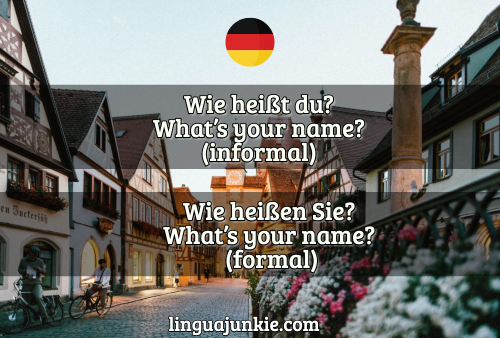
3. Mein Name ist _____. My name is _____.
- Literal translation / Meaning: My name is…
- Pronunciation: MINE NAH-MAEH IST …
This is a formal way to introduce yourself. It literally means: “My name is…”

4. Ich heiße ____. I call myself ____.
- Literal translation: I call myself… / I am called …
- Meaning: My name is…
- Pronunciation: EEH (h as in huge) HI-SAEH …
5. Ich bin ____. I am ____.
You can also use this alternative to introduce yourself, which literally means: “I am…”
- Literal translation / Meaning: I am…
- Pronunciation: EEH (h as in huge) bin
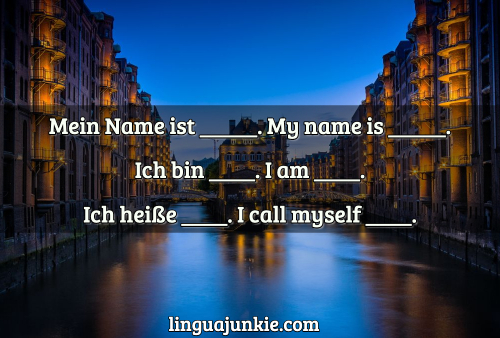
6. Es freut mich, Sie kennenzulernen. Nice to meet you. (formal)
You will also need to know how to say “nice to meet you” in German, right? Well, go ahead and use this phrase.
- Pronunciation: ES FROH-EET MIH (h as in huge) ZEE KEHN-NEN-TSOO-LEHR-NEHN
- Shorter version: Freut mich!
Note, that it has a shorter version that you can use (Freut mich!)
7. Ich komme aus den (place). I am from (place).
- I am from (place) .
- I’m from America.
- I’m from Germany.
- I’m from France.
8. Ich bin (age #) alt. I am (age #) years old.
Here’s how you say how old you are in German.
- Ich bin (age #) alt.
- I am 18 years old.
9. Ich bin (occupation). I am (a/an occupation).
Remember this phrase? You learned it above as a way to introduce yourself in German. For example, “Ich bin Bob = I am Bob.” But, you can also use it to talk about your work or occupation.
- Ich bin (occupation) .
- I am a teacher.
- I am a student.
Conclusion: Your Self-Introduction in German
So, here’s your German self introduction script you might want to use.
Hallo, Mein name ist (name). Schön, dich kennenzulernen. Ich komme aus den (place). Ich bin (age #) alt. Ich bin (occupation).
You are learning to speak and understand German, right? And you want to be understood by Germans, right? Good. And just like you, most learners out there, above all, want to speak and be understood in German. So the easy way to start speaking is…
- It’s to talk about yourself. Get that introduction.
- It’s to have a set introduction you’ll repeat again and again. Why?
- Because who doesn’t start with introducing themselves? Everyone does.
Learn to introduce yourself in German and you’ve got 1/3rd of a German conversation squared away. The rest are topics of interest and closing greetings.
Now, leave me a comment and tell me what you think.
Better, yet, introduce yourself!
The Main Junkie
P.S. I highly recommend this for German learners. If you REALLY want to learn to German with effective Audio & Video lessons by real teachers – Sign up for free at GermanPod101 (click here) and start learning!

[…] learn how to introduce yourself in German. — formally and informally. First of all, you must know that there are two forms for “YOU” in […]
[…] How to Introduce Yourself in German […]
Hallo, guten tag Ich bin anusha thapa. Ich komme aus Nepal bin 20 jahre alt . Ich bin lerne deutsch spreche in nepal …. #Herzlichen Dank For you guidens
Hallo,mein name ist cling,schon,dict kennenzulernen,ich komme aus den Nigeria,ich bin 17 al,ich bin student. im a beginner a learning germany,thanks for the self introduction lesson.
You cannot copy content of this page
- Self Introduction
- Start Conversation
- Self Introduction Generator
- Introduction in Other Languages

Self Introduction in German: Learn to Introduce Yourself in German
Have you ever found yourself in a situation where you needed to introduce yourself in a foreign language, specifically in German? Whether it’s for a job interview, meeting new friends, or simply traveling to a German-speaking country, knowing how to introduce yourself in German can be a valuable skill. In this blog post, we will explore the art of self-introduction in the German language. We’ll cover the essential components of a German self-introduction and provide you with five examples to get you started.
Why Self-Introduction in German Matters
Self-introduction is often the first impression you make on someone, and this holds true in a German-speaking context as well. Whether you’re a beginner or have some experience with the language, mastering the art of self-introduction in German is crucial for effective communication and building connections. It demonstrates your respect for the culture and your willingness to engage with the locals on their terms.
Components of a German Self-Introduction
- “Ich heiße [Your Name].” (I am called [Your Name].)
- “Ich komme aus [Your Country].” (I come from [Your Country].)
- “Ich bin [Your Age] Jahre alt.” (I am [Your Age] years old.)
- “Ich arbeite als [Your Occupation].” (I work as [Your Occupation].)
- “In meiner Freizeit [Your Hobbies/Interests].” (In my free time, I [Your Hobbies/Interests].)
- You can add any other relevant information you’d like to share, such as family, favorite activities, or why you’re learning German.
Examples of Self Introduction in German
Simple Self-Introduction:
German: “Hallo, mein Name ist Anna. Ich freue mich, Sie kennenzulernen. Ich komme aus Deutschland und arbeite als Lehrerin. In meiner Freizeit liebe ich es, Bücher zu lesen und wandern zu gehen.”
English: “Hello, my name is Anna. I am pleased to meet you. I come from Germany and work as a teacher. In my free time, I love to read books and go hiking.”
Pronunciation: “Hah-loh, mine Nah-muh eest Ah-nah. Eekh froy-uh mish, Zee kuhn-en-tsoo-lern-en. Eekh koh-muh owss Doytsh-lahnt oont ah-ry-bei-tuh als Lay-ree-rin. In ma-ee-ner Fry-tsyt leeb-uh eekh ess, Byu-khuh tsoo lay-zuhn oont vahn-duhrn tsoo gay-en.”
Self-Introduction with Origin and Hobbies:
German: “Guten Tag! Mein Name ist Daniel und ich komme aus Österreich. Ich bin 28 Jahre alt und arbeite als Ingenieur. Meine Leidenschaften sind das Kochen und die Musik, besonders das Gitarrespielen.”
English: “Good day! My name is Daniel, and I come from Austria. I am 28 years old and work as an engineer. My passions are cooking and music, especially playing the guitar.”
Pronunciation : “Goo-ten tahk! Mine Nah-muh eest Dah-nee-el oont eekh koh-muh owss Ös-ter-rykh. Eekh been 28 yah-reh alt oont ah-ry-bai-tuh als Een-guh-noy-uh. Mine Lay-dah-shahf-ten zint dahs Koh-khuhn oont dee Mew-zeek, bess-on-dahs dahs Gee-tahr-reh-shpee-luhn.”
Self-Introduction with Family:
German: “Hallo, ich bin Sophia. Ich komme aus Italien, aber meine Eltern stammen aus Spanien. Ich habe zwei Geschwister, einen Bruder und eine Schwester. Beruflich bin ich Übersetzerin und in meiner Freizeit reise ich gerne.”
English: “Hello, I am Sophia. I come from Italy, but my parents are from Spain. I have two siblings, a brother and a sister. Professionally, I am a translator, and in my free time, I enjoy traveling.”
Pronunciation: “Hah-loh, eekh been Soh-fee-ah. Eekh koh-muh owss Ee-tah-lee-uhn, ah-buh mahy-nuh El-tern shtah-men owss Shpah-nee-en. Eekh hah-buh tsvoy Geh-shvist-uh, ine Brud-uh oont ine Schwes-ter. Buh-roof-likh been eekh Ü-ber-tsets-uh-rin oont in ma-ee-ner Fry-tsyt ray-zuh eekh gehr-nuh.”
Self-Introduction with Travel Interests:
German: “Guten Abend! Ich bin Luca und komme aus der Schweiz. Reisen ist meine Leidenschaft, und ich habe schon viele Länder besucht. Beruflich arbeite ich im Bereich des Tourismus.”
English: “Good evening! I am Luca and come from Switzerland. Traveling is my passion, and I have visited many countries. Professionally, I work in the tourism industry.”
Pronunciation: “Goo-ten Ah-bent! Eekh been Loo-kah oont koh-muh owss dair Shvyts-igh. Ray-zen eest ma-ee-neh Lay-dah-shahft, oont eekh hah-buh shon fee-luh Lend-uh buh-zooh-kht. Buh-roof-likh ah-ry-bai-tuh eekh im Beh-rykh dess Too-reez-moos.”
Self-Introduction with Language Learning:
German: “Hallo! Mein Name ist Emily, und ich lerne Deutsch. Ich finde Sprachen faszinierend und möchte in der Zukunft als Übersetzerin arbeiten. In meiner Freizeit treffe ich mich gern mit Freunden und koche.”
English: “Hello! My name is Emily, and I am learning German. I find languages fascinating and hope to work as a translator in the future. In my free time, I enjoy meeting with friends and cooking.”
Pronunciation: “Hah-loh! Mine Nah-muh eest Eh-mee-lee, oont eekh layr-nuh Doytsh. Eekh feen-duh Shprah-khen fah-tsi-ni-er-uhnt oont mookh-tuh im ma-ye-neh tsvoo-khoonft ahlz Ü-ber-tsets-uh-rin ah-ry-bai-ten. In ma-ee-ner Fry-tsyt truh-fuh eekh mikh gehrn mit Fray-uhn-duhn oont koh-khuh.”
Mastering the art of self-introduction in German is not only a practical skill but also a way to connect with native speakers and showcase your respect for their culture. Whether you’re a beginner or have some proficiency in the language, practicing self-introductions in German is an excellent way to start conversations and make a positive impression.
In this blog post, we covered the essential components of a German self-introduction, and provided you with five examples that cater to different contexts and interests. Remember, the key to a successful self-introduction in German is to be genuine and enthusiastic. With practice, you’ll become more confident in your ability to engage with German speakers and create meaningful connections.

Drew is the creator of myselfintroduction.com, designed to teach everyone how to introduce themselves to anyone with confidence in any situation.
Related Posts
Self introduction in telugu: learn to introduce yourself in telugu, self introduction in marathi: learn to introduce yourself in marathi, self introduction in japanese: learn to introduce yourself in japanese, leave a reply cancel reply.
Save my name, email, and website in this browser for the next time I comment.
Type above and press Enter to search. Press Esc to cancel.

“My Name Is,” in German and More

So how exactly do you say “My name is,” in German? And more importantly, why should you know this?
If you travel, you’re probably going to end up making small talk at some point. And if you’re studying another language and traveling to the place where they speak that language , this is going to happen a lot. It’s happened to me many, many times.
I’ve been very lucky to travel a lot, to countries all over the world. It turns out that no matter where you go, you’re going to find people who are interested in your story. Especially in Germany, because there aren’t tons of foreigners who end up speaking German at a high level.
They want to know who you are, where you’re from, and why you’re learning their language. Natural questions, really. Funnily enough, they usually tend to ask the questions in the same ways . It’s almost like a script.
Fortunately, I’ve rattled off this script so many times that I can do it in my sleep. And each time you do it, you get better and sound more impressive to the next person who asks you.
So let’s take a look at these questions. I’ve broken them down into six handy main topics, and inside each one I’ve included a couple of different questions that I’ve been asked.
You’ll learn how to introduce yourself, say where you come from, describe your job, your hobbies, and your family, say what you’re doing in Germany, and finally say what motivates you to learn German in the first place. So essentially, you’ll learn all you need to know about talking about yourself in German.
I’m going to use informal German here for most cases, just because that’s what I usually experience as a younger man. It’s very likely that, depending on who you are and where you go, you’ll be addressed mostly with Sie instead of du .
So let’s get on with it! Learn all about introducing yourself in the German language with GermanPod101.com !
Table of Contents
- Who are You?
- Where are You From?
- How’s the Family?
- What are You Doing Here?
- What Do You Like to Do?
- Why are You Learning German?

1. Who are You?

- Who are you? (Wer bist du? )
Okay, nobody’s actually going to ask that. Not in those words, anyway. That’s far too blunt and direct, even for a people famous for their directness.
Instead they’ll start with something much simpler.
- What’s your name? ( Wie heißt du? )
Literally they’re saying “What do you call?” which makes zero sense when translated, but it helps more to think of it like “What do you call yourself?”
The answer is a piece of cake. Here’s some easy German to introduce yourself:
- My name is Yassir. ( Ich heisse Yassir. )
Another common way to introduce yourself in German is:
- I’m Yassir. ( Ich bin Yassir. )
When it comes to personal information, you should know how to talk about your age. It’s not something that’s likely to come up in conversation, but if it appears on a form or in a more formal setting, then you’ll be prepared.
The question comes in this form:
- How old are you? ( Wie alt bist du? )
It’s easy to see how close the German language can be to English. And the answer is a real piece of cake.
- I’m twenty-six years old. ( Ich bin sechsundzwanzig Jahre alt. )
With that out of the way, people usually start asking about your life. Below is some information on more phrases to introduce yourself in German.

2. Where are You From?

Where are you from? Woher kommst du?
Note that in German we have to ask (and usually answer) in the form, “Where do you come from.” There are two really common ways to answer:
- I come from Russia. Ich komme aus Russland.
- I’m an American. Ich bin Amerikaner.
The second one’s a little bit more formal and distant—and thus may not be the best way to introduce yourself in German—but it’ll save you if you panic and forget that the preposition for “come from” is aus and not one of German’s many other prepositions.
Perhaps your interlocutor is familiar with your home country, and asks:
- Which city in Spain? Welche Stadt in Spanien?
- Bilbao. Have you been there? Bilbao. Warst du schon da?
And from that point, your conversation is on a roll.
Some people—many people, really—have moved cities or even countries as they’ve gotten older. If that’s the case for you, you can use the verb wohnen , meaning “to live in.”
- I live in Munich now. Jetzt wohne ich in München.
Here it’s easy to see that adding the word jetzt , meaning “now,” causes the verb to jump in front of the subject. That sort of syntax stuff is pretty easy to pick up through examples, so keep on reading this article for more!
Lots of Germans have traveled around Europe or even the world. If you’re talking to someone who’s done lots of traveling before, they’ve almost certainly had to answer these questions too. It’s a nice change for them to be asking!

3. How’s the Family?

How’s the family? Wie ist deine familie? Actually, Germans don’t tend to bring up this question. If you’re chatting about other things and your family comes up, however, then it may be a good idea to be familiar with these phrases.
Perhaps you mentioned something about fighting with your sisters when you were younger. In that case, you may be asked something like:
- Do you have a lot of siblings? Hast du viele Geschwister?
This is an excellent opening for you to say something in the neighborhood of:
- Yeah, I have a brother and two sisters. Ja, ich habe einen Bruder und zwei Schwestern.
From there it’s pretty easy to adopt other small-talk or introduction phrases to describe your family members as well.
- My mother is a lawyer. Meine Mutter ist Juristin.
- My sister lives in Hungary. Meine Schwester wohnt in Ungarn.
4. What are You Doing Here?

What are you doing here? Was machst du hier?
Again, that’s a pretty literal translation and not something you’re likely to hear in a hostel or in a train car.
Germans are polite! They’re going to ask politely about what brought you to such-and-such a place and what you’re doing there.
Let’s assume here that you’re on a vacation in a German-speaking country. It’s just as likely that you’re there on business or that you live there, but as there’s just so much for a tourist to see in Germany it only makes sense to orient the guide in that direction.
Why You’re Here
You should probably respond with a little about the trip that you’re on. How long you’re traveling for, how long you’re staying in that city, and what you’d like to see.
- I’m here on vacation. Ich bin hier im Urlaub.
- I’m just here for a couple of days. Ich bin nur für ein paar Tage hier.
Conversations take two people. For that reason you should definitely know how to ask a couple of questions.
Of course, when they’re asking you different things, you can simply flip the same question around on them by asking Und du ? Literally “And you?”
But what if you have a new question? As an example, let’s say you’re asking for recommendations.
- What should I see here? / What should I see in (Basel)? Was soll ich hier sehen? / Was soll ich in (Basel) sehen?
That’s perfect to keep the conversation going and maybe even find out about some cool local trips .
Once you’ve finished discussing the joys of travel, the conversation may turn back to you. And it’ll become even more handy to know some words to describe yourself in German, particularly your career.
- What do you do for a living? Was machst du beruflich?
Actually, if you’re relatively young-looking, a lot of Germans will start with the question bist du noch Student/Studentin? This means “Are you still a student?” A question like that just goes to show how much Germans value education and how many people take advantage of the university system there.
It’s pretty simple to answer this question, though there’s something that can trip you up if you try to overthink it.
Normally in German the structure for talking about what you are is the same as in English, word-for-word.
- I am a man. Ich bin ein Mann.
But when it comes to jobs, that article ein/eine is dropped entirely.
- I am a writer. Ich bin Schriftsteller.
Remember that virtually every job title in German has a male and female version. Women answering this question should say Ich bin Schriftstellerin —and pretty much all female job titles end in -in .
If you don’t have a nice and simple job title, you can just say where you work. In German we use the preposition bei for saying you work at so-and-so company.
- I work at Google. Ich arbeite bei Google.
Now let’s move on to hobbies.
5. What Do You Like to Do?

What do you like to do? Was machen sie gerne?
Something tells me that you’re interested in both travel and languages. I dunno, just a hunch.
- I enjoy learning languages. Ich lerne gern Sprachen.
Without a doubt, you’ll get people asking about just how far you’ve taken that interest.
- So how many languages do you know? Also wie viele Sprachen kannst du?
Even if you’re not too proud of your pronunciation or grammar , you can and should include German on the list. If it’s clear that your speaking partner is being patient with you because of your low level, it’s better to be a little humble with your answer.
- I speak English, Polish, Arabic, and a little German. Ich spreche Englisch, Polnisch, Arabisch, und ein bisschen Deutsch.
You may sometimes see others’ language ability described with the verb beherrschen .
- She speaks six languages fluently. Sie beherrscht sechs Sprachen fliessend.
That’s a pretty formal verb and it also implies a great mastery over the languages. You might use it on a resume or to talk about other people, but it’s a bit presumptuous to use it to describe yourself.
Perhaps you’re not a linguist and have other interests in life. Strange as that may be, in that case you can talk about your hobbies or your interests.
- I like going to art museums. Ich besuche Kunstmuseen gern.
This structure is a fantastically easy way to describe something that you like to do in German. Just say that thing—“I go to museums”—and add the word gern to express the idea that doing so is enjoyable.
There’s another way that you can say this, and that’s by using the verb mögen , or “to like,” combined with the noun form of the activity. Easier shown than said:
- I like photography. Ich mag Photographie.

6. Why are You Learning German?

Why are you learning German? Warum lernst du Deutsch?
Ahhh, the big question. Why would you learn this language? I mean, enough Germans speak English that it’s a good sign of your ability if this question was asked in German!
And this is where guides can’t take you all the way. Every person’s history with German is going to be different.
Lucky for you, there’s no wrong answer to this question. Many Germans feel that more people should learn German, and many others are simply surprised and pleased that someone would do so.
Perhaps you’re learning because your family members were ethnically German or spoke the language at home.
- My mother came from Austria. Meine Mutter kam aus Österreich.
Maybe you’re really interested in European history or enjoy traveling around.
- I really like German art history. Ich mag die deutsche Kunstgeschichte sehr gern.
Or it could be that you have a fascination with German music or film .
- I find the music of Brahms absolutely breathtaking. Ich finde die Musik von Brahms absolut atemberaubend.
All of these are valid answers!
One of the classic questions when talking about languages is how much time you’ve spent on it. Most people take classes for many years and often never really get to a good level. They’re simply curious how long you’ve been into it to get to the level that you’re at.
Here’s a typical way this conversation could play out.
- How long have you been learning German? Wie lange lernst du schon Deutsch?
- A little longer than… (a year, a month…) Ein bisschen mehr als… (ein Jahr, ein Monat…)
- Then you already speak very well! Dafür sprichst du sehr gut!
The word dafür there literally means “for that.” It’s kind of like saying “in that case” or “taking that into account…” Those phrases can sometimes sound a bit rude in English, but not so in German. It’s a pure compliment.
7. Conclusion
Talking about yourself is just one tiny bit of knowing a foreign language, but it’s something you’ll need to do at any level.
Hopefully this article has shown you a couple of reasons why it doesn’t have to be anything to worry about!
On the whole, German speakers are kind and patient when it comes to speaking with learners of their language. I’ve had nothing but excellent experiences traveling in and around three different German-speaking countries.
So whenever you’re ready to take the plunge and move into conversational German, be ready to talk about yourself! And let GermanPod101.com help you along every step of the way by visiting our site and using our effective resources, including free vocab lists and our MyTeacher app !
Author: Yassir Sahnoun is a HubSpot certified content strategist, copywriter and polyglot who works with language learning companies. He helps companies attract sales using content strategy, copywriting, blogging, email marketing & more.
Or sign up using Facebook
Got an account? Sign in here

How To Say ‘Thank you’ in German

Hi, What’s Up, and Beyond: How to Say Hello In German

How to Say I Love You in German – Romantic Word List

The 5 Go-To German Podcasts for Language Learners

Intermediate German Words to Level Up Your Vocab

German Animal Names: The Ultimate Vocabulary List
How to celebrate april fools’ day in german.
- Forum Spotlight
- Scheduled Maintenance
- German Holidays
- German Dictionary
- German Language
- German Translation
- German: one word at a time
- Guest Bloggers
- Advanced German
- German Alphabet
- German Grammar
- German Lessons
- German Online
- German Phrases
- German Podcasts
- German Words
- Tips & Techniques
- Life in Germany
- Living in Germany
- Media Coverage
- News in German-speaking countries
- Feature Spotlight
- Speak German
- Success Stories
- Teaching German
- Team GermanPod101
- Uncategorized
- Word of the Day
- Immigration, Visas
Copyright © 2024 Innovative Language Learning. All rights reserved. GermanPod101.com Privacy Policy | Terms of Use . This site is protected by reCAPTCHA and the Google Privacy Policy and Terms of Service apply.
23+ Easy Phrases To Introduce Yourself In German
- , October 10, 2023

Are you heading to Germany for travel or business? Met a new German friend? Maybe you’ll be living there? Then, you’ll want to learn how to talk and introduce yourself in German! Read this article and get to know some of the essential words and phrases to help you introduce yourself and fit right in. You can learn what are the basic dos and dont’s when you introduce yourself in German too.
You can even discover the best language learning app that has free basic lessons if you’re starting with zero knowledge. Can’t wait? Let’s learn with the Ling app !
Where In Europe Is German Spoken?
The German language is actually a really popular spoken language (it’s #11 in the world! ). Germany, Austria, and Switzerland are all German-speaking countries. Learning how to introduce yourself in German will help you if you visit or move to one of those countries.
We know learning a foreign language is a challenge, even the basics. So we want to help make meeting native speakers and talking to them in German a breeze. This article will teach you some words and phrases on how to introduce yourself in German, so let’s get going!
The Dos And Don’ts Of Introducing Yourself In German & Basic Phrases

Introduce Yourself In German: Dos
The most common way you’ll want to introduce yourself in German when meeting someone for the first time is to say “Hallo!” which means hello. People in Germany say hello to everyone, even complete strangers. It’s considered polite.
While saying “Hallo” or “Guten Tag,” you’ll want to make good eye contact and shake the person’s hand. Keep things simple! If asked for your name, be sure to state your first and last name, as Germans are pretty formal that way.
Introduce Yourself In German: Don’ts
By all means, do not lean in to kiss anyone, and surprisingly, you shouldn’t ask people how they are doing when you first meet them. It’s considered unusual to ask about people’s personal lives right away.
Another no, no when introducing yourself in German is to make small talk. This isn’t common practice, and Germans may find this odd, especially in a formal setting. Appropriate small talk topics would be the weather or the form of transportation you used to get to the location. Just steer away from topics that are too personal.
Also, it is important to know that there are different pronouns to use in an informal setting, so be mindful of that when speaking with others other than family or friends!

Other Common Ways To Greet People In German
- Guten Morgen! Good morning!
- Guten Tag! Good day/afternoon!
- Grüß Gott! Good day/afternoon! (Used in Southern Germany and Austria)
- Grüezi! Good day/afternoon! (Used in Switzerland)
- Guten Abend! Good evening!
These greetings are typically used in formal situations, such as when meeting elders, superiors, or new business acquaintances.
If you’re greeting friends, younger people, or family members, it’s not necessary to use the above greetings. Rather you can simply say the phrase, “Hi” or “Hey / Hey” and if you’re in Northern Germany, like Hamburg you can even say “Moin” . This is how you say hi in Germany, but if you are in Austria or Switzerland, they prefer to say, “Servus!” or “Hoi !” instead.
Formal And Informal Personal Pronouns
It’s important to know that there are two kinds of the pronoun “You” in German to use in a phrase or question. The first one we’ll go over is the informal “You.”
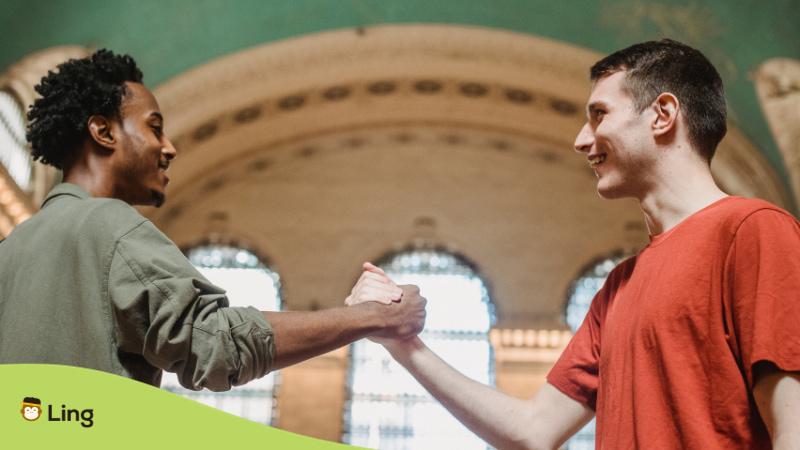
When To Use The Informal Pronoun Du
When you see or hear “Dir” or “Dich,” this refers to the personal pronoun “Du,” which is easy to remember because it rhymes with “You!”‘ The pronoun “Du” is used when you’re talking to family, friends, or people younger than you.

When To Use The Formal Pronoun Sie
Now let’s look at the formal use of “You” in the German language.
When you see or hear “Ihnen,” this refers to the pronoun “Sie.” This pronoun is required when speaking in a formal way, such as when talking with older people, anyone superior to you, business clients, and best when meeting people for the first time.
There are also neutral ways to discuss others, which we’ll see in some examples below.

How To Introduce Yourself And Others In German
Introducing yourself in german.
After greeting someone for the first time, it’s appropriate to introduce yourself by telling them your name:
- “Ich bin (your name).” / I am _________ .
- “Mein Name ist (insert your name).” / My name is ___________ .
- While small talk isn’t common nor expected, Germans may recognize that you aren’t from Germany and may be curious to know a bit about you. Let’s look at some answers to some common questions you may be asked:
- Ich komme aus (insert country or city). / I am from __________ . [
- Ich spreche Deutsch. / I speak German .
- Ich spreche ein bisschen Deutsch. / I speak a little German .
- If you speak English, you may notice that the grammatical sentence structure for German is quite similar. This makes it less complicated to pick up this new language. Let’s look at this example:
- Wie alt bist du? The literal translation is: How old are you?
The sentence structure is like in English: question word, adjective, helping verb, and pronoun. Here is another example:
- Ich bin Student. The literal translation is: I am a student.
The sentence structure is the same: pronoun, the verb to be, noun.
Introducing Others In German
These are useful German introduction phrases and the most common ways to speak when introducing people you know well to others.
- Das ist meine Schwester (insert name) . / That’s _______, my sister. (neutral
- Das ist mein Bruder (insert name) . / That’s _______, my brother. (neutral)
- Das ist meine Tochter (insert name) . / That’s _______, my daughter. (neutral)
- Das ist mein Sohn (insert name) . / That’s _______, my son. (neutral)
- Das ist meine Mutter (insert name) . / That’s _______, my mother. (neutral)
- Das ist mein Vater (insert name) . / That’s _______, my father. (neutral)
- Das ist mein Freund (insert name) . / That’s _______, my friend. (neutral)
- Darf ich dir meinen Freund vorstellen? / May I introduce my friend? (informal)
- Ich möchte Ihnen gerne meinen Chef vorstellen. / I would like to introduce you to my boss ( formal
- Ich möchte, dass Sie (insert name) kennenlernen. / I would like you to meet _________(formal)

How To Introduce Yourself: Conversation Examples
Learning German will help you in basic conversations. Having these phrases and questions under your belt will get you a long way and impress your new acquaintances or friends!
German Introductions In A Formal Conversation
Introducing yourself in a formal way is quite nerve-wracking. Especially, if you’re not familiar with the language. Don’t fret. German introductions are easy as long as you remember the basic phrases to use for someone you just met. Here is a great way to practice a formal conversation for German introductions.
- You: Hello / Hallo
- Acquaintance: Good Day / Guten Tag
- You: My name is ___________ / Mein Name ist (your name)
- Acquaintance : Nice to meet you. My name is _________/ Freut mich, Sie kennenzulernen. Mein Name ist __________
- Acquaintance : Where are you from? / Woher kommen Sie?
- You : I am from __________ / Ich komme aus ____________
- Acquaintance : Do you speak German? / Sprechen Sie Deutsch?
- You : I speak German. Are you from Germany? / Ich spreche Deutsch. Kommen Sie aus Deutschland?
- Acquaintance: I come from Germany. Pleasure to meet you / Ich komme aus Deutschland. Es freut mich, Sie kennenzulernen.
- You : You too / Mich auch.
German Introductions In An Informal Conversation
Let’s practice some German introductions in an informal setting. Remember, try speaking to mimic the sound as you press play from the audio snippet.
- You: Hi / Moin
- Other person : Hey / Hey
- You: I am _________. What’s your name? / Ich bin __________. Wie heißt du?
- Other person : My name is _________. Do you speak German? / Mein Name ist ________. Sprichst du Deutsch?
- You : I speak a little German. / Ich spreche ein bisschen Deutsch.
- Other person: Where are you from? / Woher kommst du?
- You : I am from __________ / Ich komme aus ____________
- Other person: Great to meet you. / Schön, dich kennenzulernen.
- You : Hope to see you again. / Ich hoffe, wir sehen uns wieder.
Learn More Basic German
Now that you know how to introduce yourself in German, start learning German today with the Ling app , the best language app out there today! Choose the German language course or choose from over 60 other languages. Learn basic German phrases in just 15 minutes or less a day so you’ll feel confident when you talk to Germans.
Learning German with Ling is fun ! You’ll learn how to speak, read, and write in German with ease. Go ahead and check it out on the Play Store or App Store right now! We know you’ll find it easy to learn with Ling .
One Response
I really like this
Leave a Reply Cancel reply
You must be logged in to post a comment.
Discover more

People also read

Celebrating St. Patrick’s Day In Germany: #1 Best Guide

7 Best Apps For Learning German Quickly In 2023
Thank you in german: 18+ remarkable ways.

5+ Best Ways To Say Okay In German Like A Pro

65+ Simple Ways To Say Greetings In German

Yes In German: 49 Amazing Terms To Learn
Southeast asia, east europe.
© 2024 Simya Solutions Ltd.
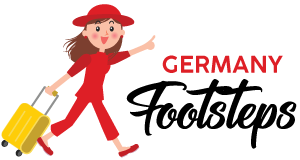
Germany Footsteps
Lesson 11: How To Introduce Yourself In German
Want to learn German or want to learn something quickly you can definitely use in Germany? Learn how to introduce yourself.
Introducing yourself in German isn’t that hard. Although it does differ with English in that you approach this differently whether you are in an informal or formal setting.
Love Germany? Click here to download your free guide to 25 Incredible Things You Must Do In Germany In Your Lifetime . You won’t want to miss them!
Don’t miss the best hotel savings in Germany here >>
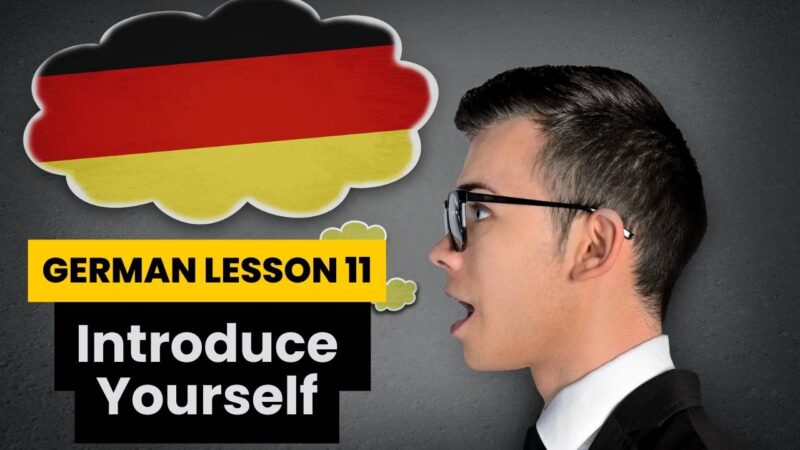
Watch the video below to learn thow to introduce yourself in German in both of these settings. Below the video, you’ll find a list of the vocabulary used so you can write it down and practise.
You can do this!
Vocabulary taught in this lesson:
- Ich heiße Sharon – My name is Sharon (informal)
- ch heiße Sharon Gourlay – My name is Sharon Gourlay (formal)
- Schön, dich kennenzulernen – Nice to meet you (informal)
- Schön, Sie kennenzulernen – Nice to meet you (formal)
Time to practise until you can say these words without thinking 🙂
Want to learn more German? Find the previous lesson here and your next lesson here . You can also find all our lessons here .
Related Articles:

By Elsa Meyer
Elsa was born in Germany before moving to the US as a kid. She spent many summers exploring Germany and hanging out with her grandparents before moving back to Germany for university. Elsa has a degree in German history and language. She enjoys sharing her love of her native country with others who want to explore it too! She particularly loves exploring the Rhine Valley and the Black Forest.
Leave a comment Cancel reply
Your email address will not be published. Required fields are marked *
Save my name, email, and website in this browser for the next time I comment.
This site uses Akismet to reduce spam. Learn how your comment data is processed .
GROUP LESSONS AVAILABLE. Check out by clicking here!
German writing tips: introduce yourself
sabine 11.2015 Allgemein 1 Comment
Learn how to write a short introduction about yourself in German. This can also be used for your Level A1 test preparation.
LISTEN to the text here (click me)
Useful Vocabulary:
Verbs (all highlighted in the text above)
- ich bin – I am
-> You can use “Ich bin” and add your name, your age and your job! E.G. “Ich bin Martina. Ich bin 22 Jahre alt. Ich bin Journalistin.
To say your name, you can also use the verb “heißen”: Ich heiße Martina.
- ich studiere – I study
- meine Hobbies sind – my Hobbies are
-> if you have only one hobby: “Mein Hobby ist ..”
some other hobbies: lesen, singen, tanzen, reisen, fotografieren, Musik hören, wandern, joggen,…
- ich wohne in – I live in
- in the German language, nouns, names and places are written with a capital letter*. Examples from the text: Leute, Andreas , Jahre, Berlin, Anglistik, Hobbys (plural), Sport, Sprachen.
- “ich” is only written with a capital at the beginning of a sentence, so this is not like in English. But we do use capitals for the formal pronouns “Sie”, “Ihre”, etc. For more information, please also refer to the link below.
*of course that’s not all, for more information about when to use the capital letter in German, please look here .
- the German Plural of Hobby is “Hobbys” with a “y”
- more information about numbers and their pronunciation: see here
Now, for your own German writing practise, why not write your own introduction ! If you want a feedback, leave your introduction in the comments!
Happy studying!
One Comment on “ “German writing tips: introduce yourself” ”
Hallo, Mein Name ist Robert Longwe. Ich bin Zwei und dreißig Jahre alt und ich wohne in Hallenberg jetzt. Mein Beruf ist Klempner. Ich habe vor fünf Jahren geheiratet und Ich habe ein Kind. Meine Hobbys sind; Singen, Boxen, Musik hören Und Sport machen. Ich spreche; Englisch, Afrikans und ein bisschen Deutsch
Leave a Reply Cancel reply
Your email address will not be published. Required fields are marked *
Notify me of follow-up comments by email.
Notify me of new posts by email.

IMAGES
VIDEO
COMMENTS
Learn how to introduce yourself in German in various situations, such as meeting friends, neighbors, colleagues, or authorities. Find out the essential greetings, how to say where you are from and what you do, and see examples of self-presentation in German.
How to introduce yourself and someone else in German. The differences between introducing yourself formally and informally. How formal and informal introductions in German sound with example conversations. When to Use Formal & Informal German. Before we get started, an important feature of German is it’s use of the 2 words for ‘you’.
The eight essay examples provided in this article (Easy German Essays for Beginners) offer a range of topics that will help you practice your writing skills, expand your vocabulary, and gain confidence in your ability to express yourself in German.
In this lesson, you'll learn how to Introduce Yourself in German in 5 lines. You learn the German Phrases and get the English translations. For Beginners.
We’ll start with simple ways to introduce ourselves in German. We’ll discuss how to ask others their names in both formal and informal situations. We’ll even tackle how to politely offer a little extra help with pronouncing or spelling your name.
Examples of Self Introduction in German. Simple Self-Introduction: German: “Hallo, mein Name ist Anna. Ich freue mich, Sie kennenzulernen. Ich komme aus Deutschland und arbeite als Lehrerin. In meiner Freizeit liebe ich es, Bücher zu lesen und wandern zu gehen.” English: “Hello, my name is Anna. I am pleased to meet you.
You’ll learn how to introduce yourself, say where you come from, describe your job, your hobbies, and your family, say what you’re doing in Germany, and finally say what motivates you to learn German in the first place.
Introduce Yourself In German: Dos. The most common way you’ll want to introduce yourself in German when meeting someone for the first time is to say “Hallo!” which means hello. People in Germany say hello to everyone, even complete strangers. It’s considered polite.
Want to learn German or want to learn something quickly you can definitely use in Germany? Learn how to introduce yourself. Introducing yourself in German isn’t that hard. Although it does differ with English in that you approach this differently whether you are in an informal or formal setting.
German writing tips: introduce yourself. sabine11.2015 Allgemein 1 Comment. Learn how to write a short introduction about yourself in German. This can also be used for your Level A1 test preparation. LISTEN to the text here (click me) Useful Vocabulary: Verbs (all highlighted in the text above) ich bin – I am.